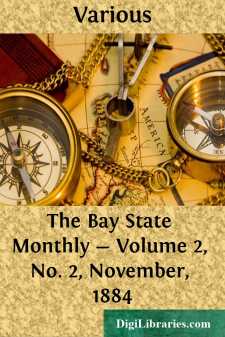Categories
- Antiques & Collectibles 13
- Architecture 36
- Art 48
- Bibles 22
- Biography & Autobiography 813
- Body, Mind & Spirit 142
- Business & Economics 28
- Children's Books 17
- Children's Fiction 14
- Computers 4
- Cooking 94
- Crafts & Hobbies 4
- Drama 346
- Education 46
- Family & Relationships 57
- Fiction 11829
- Games 19
- Gardening 17
- Health & Fitness 34
- History 1377
- House & Home 1
- Humor 147
- Juvenile Fiction 1873
- Juvenile Nonfiction 202
- Language Arts & Disciplines 88
- Law 16
- Literary Collections 686
- Literary Criticism 179
- Mathematics 13
- Medical 41
- Music 40
- Nature 179
- Non-Classifiable 1768
- Performing Arts 7
- Periodicals 1453
- Philosophy 64
- Photography 2
- Poetry 896
- Political Science 203
- Psychology 42
- Reference 154
- Religion 513
- Science 126
- Self-Help 84
- Social Science 81
- Sports & Recreation 34
- Study Aids 3
- Technology & Engineering 59
- Transportation 23
- Travel 463
- True Crime 29
The Bay State Monthly - Volume 2, No. 2, November, 1884
by: Various
Categories:
Description:
Excerpt
GROVER CLEVELAND.
By HENRY H. METCALF.Save only that of Ulysses S. Grant, no name in America has come from comparative obscurity into national eminence in so short a time as that of GROVER CLEVELAND.
The fame of Grant was wrought out through the exigencies of a great civil war, in which the unity of the Republic was the issue involved. The distinction which Cleveland has achieved comes of valiant service in another field of conflict, wherein the issue involves the perpetuity and dominance of the great principles which constitute the framework and fibre of republican government itself. Under ordinary circumstances, probably, neither Grant nor Cleveland would have risen above the plane of every-day life. The same, too, might perhaps justly be said even of Washington. In the history of human progress it will be seen that every great crisis involving the triumph of the principles and tendencies which make for the moral, social, or political advancement of mankind has developed a leader endowed with the special qualities demanded by the occasion.
The brilliant and self-assertive men who press forward to leadership in ordinary times, whether impelled by mere love of notoriety, personal ambition, or an honest desire to promote the welfare of their fellow-men, seldom become masters of the situation when a supreme emergency arises. They may set in motion great contending forces; they may precipitate conflicts whose ultimate outcome brings inestimable benefit to mankind; but other hands and other minds are required to direct the issue and shape the result. The master spirit of the occasion is born thereof. Ulysses S. Grant had absolutely no part in bringing about that great conflict of ideas and systems which culminated in the war of the rebellion; nor had he even figured prominently in the field of military achievement until long after hostilities were commenced, and the struggle had assumed proportions entirely unforeseen by, and actually appalling [62] to, not only the people themselves, but those In control of active operations in the field. But the emergency developed the man required to meet it, and Grant came to the front.
So, too, in this later and greater conflict, which is to test the virtue and determine the durability of popular government—whose outcome is to decide whether political parties are to be the mere instruments through which the people express their will, and whose relations can be changed as the public good may seem to require, or whether the government itself shall be subordinated to party, and its functions prostituted for the perpetuation of party ascendency and the aggrandizement of corrupt and selfish individuals—the leader in whom the hopes of those who contend for the supremacy of the popular will, the surbordination of party-power to public welfare, and the administration of the government in the interests of the whole people, are now thoroughly centred, is one who has gained no distinction in shaping partisan contests, and won no laurels in the halls of legislation or the forum of public debate....












